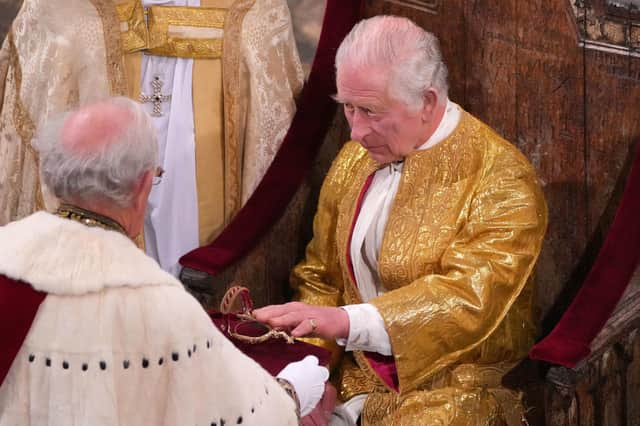Ruth Dudley Edwards: Coronation of King Charles is a reminder of what a wonderful privilege it is to live in a country that cherishes its long and complex history


The Lord Great Chamberlain had been explaining that one of his most important roles at the coronation was to present golden spurs — symbolising knighthood and chivalry — to King Charles III.
These had been created for Richard I in the 12th century, but destroyed by Cromwell five centuries later along with most of the royal regalia. However they didn't hang about in those days, so when the new establishment had second thoughts about the wisdom of the beheading of Charles I in 1649 and restored the monarchy in 1660, he was provided with magnificent replacements.
Advertisement
Hide AdAdvertisement
Hide AdCarrington spoke about it with that mixture of pride in tradition, self-deprecation and evident enjoyment of the dottiness as well as deep significance of some ancient customs that the English aristocracy do so well.
But it was one of the many reminders for me this last week of what an extraordinary and wonderful privilege it is to live in a country that cherishes its long and complex history and tells the truthful story of more than 1,000 years in all its greatness and awfulness with the help of historical artefacts.
Another was a celebration at a 17th century Covent Garden church of glorious choral music commissioned for royal occasions over four centuries.
I listened to that with two friends who come from a family of Eastern European Jewish refugees from Nazism and a relatively recent arrival from Shanghai. Wonderful music can transcend any cultural barriers and we were all blown away by it.
Advertisement
Hide AdAdvertisement
Hide AdAnd then of course there was the extraordinary and brilliantly executed coronation — the fortieth in Westminster Abbey — which I watched and celebrated with another mixed bunch.
Along the way I was interviewed for an Irish radio programme with an English republican who seemed to find monarchy a personal outrage.
My simple view is democracies should have whatever system of government they want that works. President Michael D Higgins is not my kind of guy, but as an Irish citizen I would bow to him politely.
I am baffled that in the name of equality and democracy evangelical English republicans want to abolish a head of state that suits the majority of the population. In an extensive poll last week of 11,000 people in the UK, two-thirds thought monarchy gave Britain stability.
Advertisement
Hide AdAdvertisement
Hide AdThe analysis of those polled was that 7% were committed royalists; 32% mainstream monarchists “who back the institution but recognise the need to change with the times”; 24% “neutral pragmatists, who lean towards the status quo largely because they think the alternative would be worse”; 19% “modern republicans, who see the monarchy as divisive and worry about its colonial legacy”; and the remaining 18% are “angry abolitionists, who think the royals care little for the country and believe the institution has no place in the modern world”.
I understand though don’t share the objections about hereditary privilege, but anyone who thinks that Elizabeth II or her son cared little for the country has been paying no attention to the extraordinary work they put in all their lives trying to serve its people and those of the Commonwealth. And as the coronation showed graphically, Charles is widely lauded for fostering a multi-ethnic, multi-faith society.
Over more than 1,000 years, this country has tamed its royals. Parliament is supreme, royal power is clearly curtailed, hard work is a requirement. And while peccadillos are forgiven, meddling in politics at the level of President Higgins would not be tolerated.
When Queen Elizabeth died, it was astonishing how often that old-fashioned word “duty” was dusted off, and how much recognition there grew of the daily grind she and her family had put into travelling at home and abroad in the interests of the United Kingdom. That’s how Camilla earned her spurs.
Advertisement
Hide AdAdvertisement
Hide AdThe deal is clear. As Ben Lowry, the editor of this newspaper, put it last week: “Charles knows, as does William, that the public simply will not tolerate a selfish king or queen. The public expects, then admires, royals who are selfless. So long as we have monarchs who understand this, as we are set to have for decades to come, the monarchy is likely to be safe.”
God save the King.